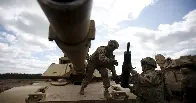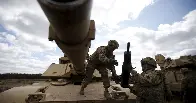Exclusive: US to send depleted-uranium munitions to Ukraine
Exclusive: US to send depleted-uranium munitions to Ukraine

The Biden administration will for the first time send controversial armor-piercing munitions containing depleted uranium to Ukraine, according to a document seen by Reuters and separately confirmed by two U.S. officials.

cross-posted from: https://lemmus.org/post/587773
Edit: antiwar article, quotes for both articles
The rounds, which could help destroy Russian tanks, are part of a new military aid package for Ukraine set to be unveiled in the next week. The munitions can be fired from U.S. Abrams tanks that, according to a person familiar with the matter, are expected be delivered to Ukraine in the coming weeks.
Although Britain sent depleted uranium munitions to Ukraine earlier this year, this would be the first U.S. shipment of the ammunition and will likely stir controversy. It follows an earlier decision by the Biden administration to provide cluster munitions to Ukraine, despite concerns over the dangers such weapons pose to civilians.
The United States used depleted uranium munitions in massive quantities in the 1990 and 2003 Gulf Wars and the NATO bombing of former Yugoslavia in 1999.
Still, the radioactive material could add to Ukraine's massive post-war clean-up challenge. Parts of the country are already strewn with unexploded ordnance from cluster bombs and other munitions and hundreds of thousands of anti-personnel mines.
https://news.antiwar.com/2023/09/03/us-to-arm-ukraine-with-toxic-depleted-uranium-ammunition/
But at this point in the war, the administration has shown it’s not concerned about damaging Ukraine’s environment. In July, the US started arming Ukraine with cluster bombs, which spread small submunitions over large areas. Unexploded submunitions, or bomblets, can be found by civilians years or decades after use. Because of their history of killing civilians, cluster munitions have been banned by over 100 countries.


